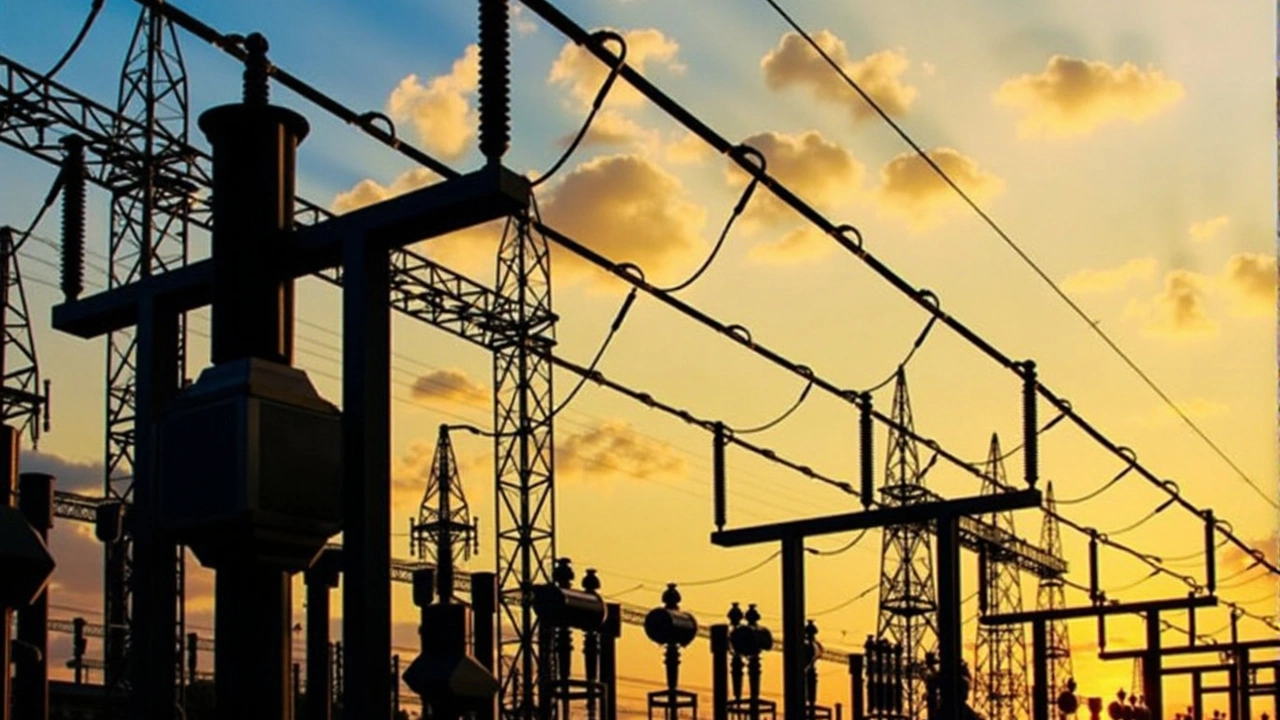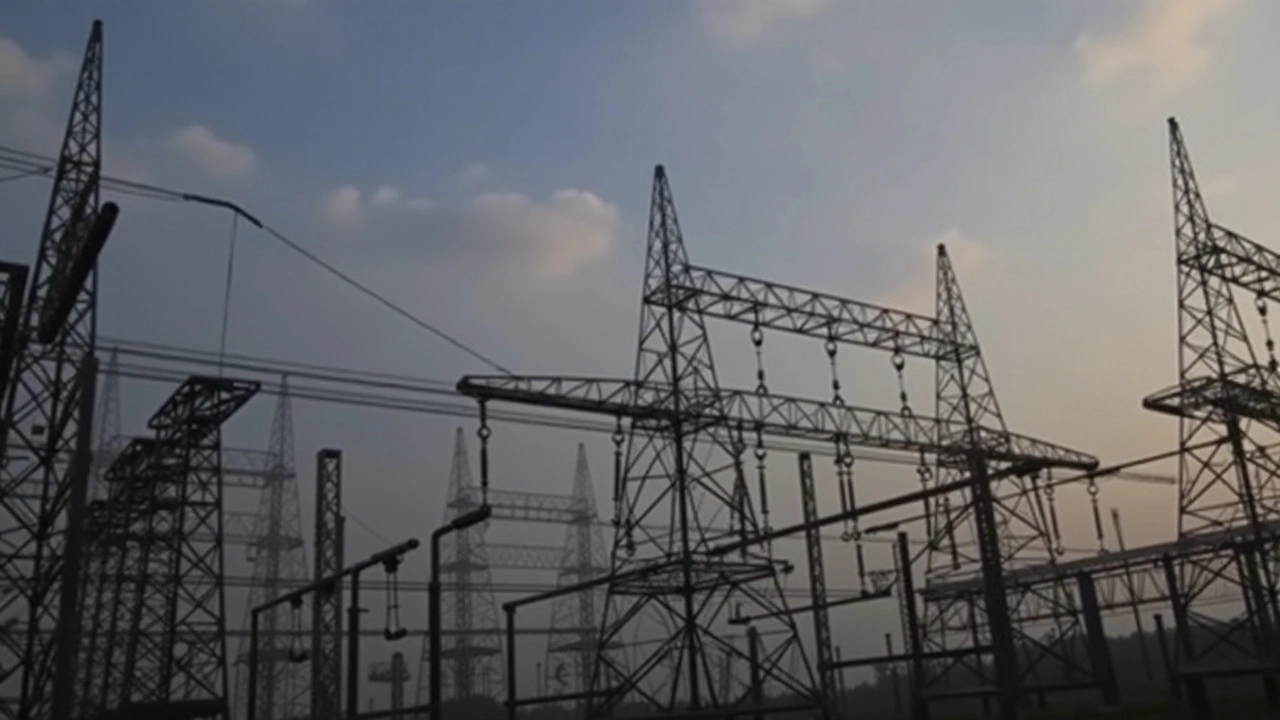Recurring Grid Failures Leave Nigeria in Darkness
In a dramatic and increasingly concerning pattern, Nigeria witnessed another nationwide blackout on October 14, 2024, as the national electricity grid succumbed to its sixth collapse this year. The incident unfolded at precisely 6:58 pm, according to the Abuja Electricity Distribution Company (AEDC). Such blackouts are not merely inconvenient; they represent a significant disruption to daily life and economic activity across the nation. The power outage affected a wide swathe of the country, cutting across five key states—Abia, Anambra, Ebonyi, Enugu, and Imo—where the Enugu Electricity Distribution Company (EEDC) operates, confirming that all their Transmission Company of Nigeria (TCN) interface stations were out of supply.
Widespread Impact and Response
The blackout underscored the fragility of Nigeria's power infrastructure, which has seen multiple failures over the past months. In response, electricity distribution companies like the Eko Electricity Distribution Company (EKEDC) are now working in tandem with stakeholders and authorities to restore power as swiftly as possible. Despite these efforts, the lingering instability of the power grid raises pressing questions about the root causes and long-standing challenges in Nigeria's electricity sector.
Historical Context of Grid Failure
This particular collapse adds to a string of precedents, marking the sixth failure of the national grid in just the ten months of 2024. Previous collapses occurred on February 4, March 28, April 15, July 6, and August 5, further intensifying the scrutiny on the management of the country's power systems. While attempts have been made to enhance reliability and efficiency, the recurring nature of these incidents exposes systemic flaws that need urgent attention.
Efforts to Stabilize a Shaky Grid
Over the years, authorities have undertaken various measures to address this persistent issue. Notably, the Transmission Company of Nigeria had proudly reported a marked reduction in grid disturbances—a decrease of 76.47%—from 85 disruptions between 2015 and 2019 to 20 collapses from 2020 to May 1, 2024. Yet, this latest incident calls into question the efficacy of those measures. The introduction of the Generation Dip/Loss Detection System (GLDS), a digital monitoring apparatus designed to quickly locate and mitigate sudden power generation losses, has been one of their key strategies to bolster stability and response time.

Looking Towards a Reliable Power Future
While the TCN has not yet issued an official statement on the precise trigger for the latest collapse, the continued recurrence of blackouts demands a more profound and comprehensive intervention. There's a growing consensus among analysts and consumers alike that the country's power infrastructure requires an overhaul—encompassing policy reforms, infrastructural investments, and technological upgrades. Such steps are vital, not only for preventing further grid collapses but for laying a sustainable foundation for Nigeria's future energy security.
The Human Cost and Hope for Resolution
The frequent and expansive power failures adversely affect countless facets of Nigerian life. Industrial production halts, businesses incur losses, and everyday activities are disrupted, stretching from metropolitan centers to rural communities. The reliance on alternative power sources, such as diesel generators, places additional financial burdens on citizens and exacerbates environmental challenges. However, amidst these adversities, hope persists. The national conversation continues to focus on innovative solutions, local and international partnerships, and the direct involvement of private sectors in the bid to revitalize Nigeria's power narrative.
Understanding the intricate layers of Nigeria's power crisis involves looking beyond mere technical fixes. It is about encapsulating a vision that not only addresses today's challenges but is resilient enough to preclude tomorrow's risks. Only through informed, strategic, and collective action can Nigeria transition from these frequent episodes of darkness into a new dawn of stable and reliable electricity supply.

Rahul Sharma
October 15, 2024 AT 07:00Wow, the situation in Nigeria is absolutely critical!!! The sixth grid collapse in just ten months is a stark indicator that the underlying infrastructure is terribly fragile!!! The repeated failures suggest systemic neglect, mismanagement, and perhaps even corruption!!! Engineers and policymakers need to perform a comprehensive audit, identify choke points, and invest heavily in modernizing transmission lines!!! It's not just about adding more generation capacity; the balance between load and supply must be finely tuned using advanced SCADA systems!!! The Generation Dip/Loss Detection System (GLDS) is a step in the right direction, but its efficacy is questionable if the grid's fundamental resilience isn’t improved!!! Moreover, frequent blackouts cripple industrial output, push businesses to rely on diesel generators, and increase greenhouse gas emissions!!! The economic cost is staggering, with lost productivity, increased operational expenses, and a dent in foreign investment confidence!!! There's also a social dimension: households experience disrupted daily life, students can't study, and hospitals risk losing power for critical equipment!!! In many ways, this crisis resembles a chronic disease that requires both immediate treatment and long-term lifestyle changes!!! Policymakers must prioritize transparent procurement, enforce maintenance protocols, and foster public‑private partnerships for sustainable funding!!! International expertise could be leveraged, but solutions must be tailored to Nigeria's unique geographic and demographic realities!!! Finally, accountability mechanisms should be strengthened so that repeated failures are met with concrete consequences for negligence!!! By confronting these challenges head‑on, Nigeria can transform its power sector from a recurrent nightmare into a beacon of growth and stability!!!
Emily Kadanec
October 20, 2024 AT 16:36its obvious they need more investmnt in grid.
william wijaya
October 26, 2024 AT 02:12Reading through this, I can almost hear the hum of generators trying to pick up the slack, a chaotic symphony of power loss!!! The grid's recurring collapses are like a bad loop in a code-bugs that never get patched!!! From a technical standpoint, the lack of redundancy and real‑time load balancing is glaring!!! If you sprinkle in some of that SCADA jargon, you get terms like frequency regulation, fault detection, and voltage stability-basically the holy trinity of grid health!!! Without those, it's just a house of cards waiting to tumble!!! The human toll is heartbreaking; families left in darkness, businesses grinding to a halt, and the whole nation feeling the sting of unreliability!!!
Lemuel Belleza
October 31, 2024 AT 10:48Another blackout, same old story. Looks like nothing's changing.
faye ambit
November 5, 2024 AT 20:24One could argue that the persistent power outages reflect deeper structural issues within governance and resource allocation. When we examine the interplay between policy decisions and infrastructural degradation, a pattern emerges that calls for holistic reform. It's essential to foster inclusive dialogues that bridge technical expertise with community experiences. Only through such integrative approaches can sustainable solutions take root. The hope lies in collective patience and persistent advocacy.
Subhash Choudhary
November 11, 2024 AT 06:00Man, this is rough. The grid keeps crashing and no one's fixing it properly. It feels like a never‑ending loop of outages. Hope they sort it soon, because we all need steady power.
Ethan Smith
November 16, 2024 AT 15:36The repeated incidents underscore the necessity for comprehensive system upgrades. A methodical approach, focusing on both transmission infrastructure and generation balance, is paramount. Stakeholders must prioritize transparent procurement processes to avoid inefficiencies. Furthermore, integrating renewable sources could alleviate strain on the existing grid. Consistent monitoring will help preempt future failures.
Evelyn Monroig
November 22, 2024 AT 01:12They never tell us the real reason-it's all a cover‑up for deeper power‑play by elites. The grid collapses are engineered to keep the masses dependent.
Gerald Hornsby
November 27, 2024 AT 10:48Interesting point, Ethan. 🤔
Hina Tiwari
December 2, 2024 AT 20:24i totally feel for the peopel. its so frustating when the lights go out mid night. hope they find a soluton soon. its not fair.
WILL WILLIAMS
December 8, 2024 AT 06:00Power up, Nigeria! We can do it! Stay strong!